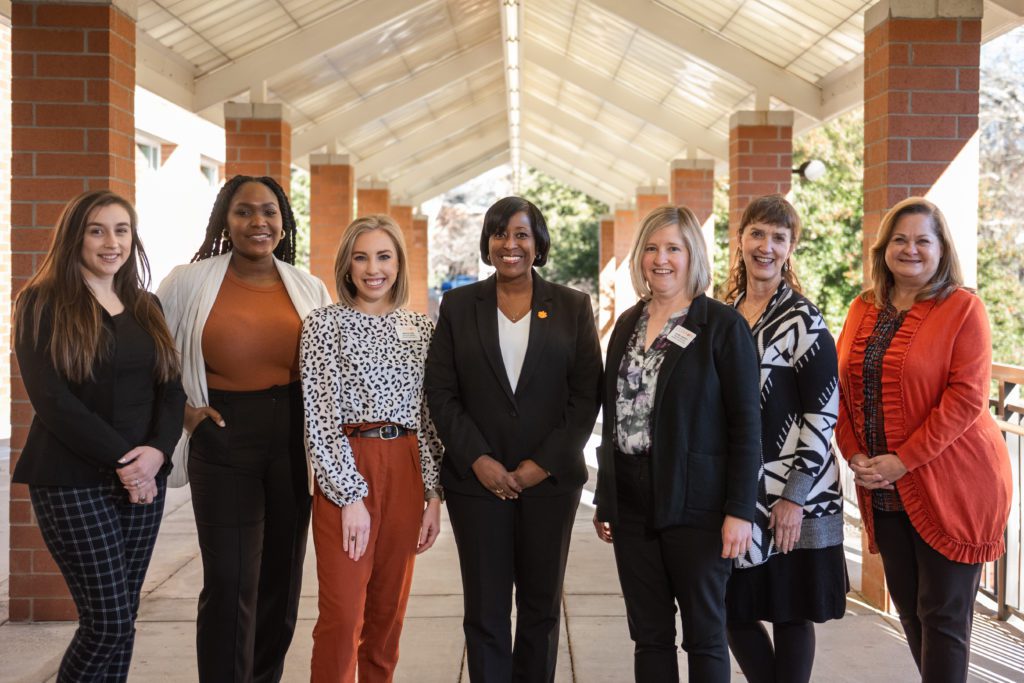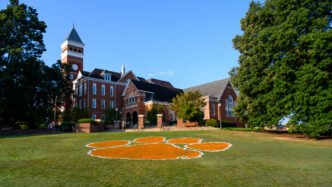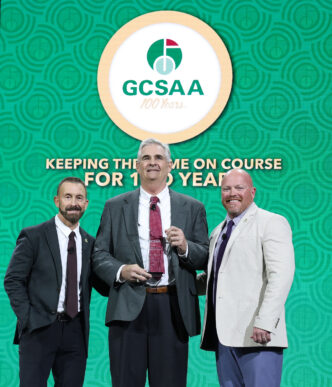Lauren Parker recently celebrated her one-year anniversary as a member of the Clemson University staff. You’d be hard pressed to find a more impactful year in her life than the 12-month period that just concluded. Not only did she make history as the first interpersonal violence response coordinator at her alma mater, she also gave birth to her first child.
Entering year two, what does Parker hope to see for an encore?
Increased visibility on campus and with the Clemson student population, for starters.
“Part of our hope for this year is ensuring students know we’re here,” she said. “We need to be more visible. This semester, specifically, we want to focus on being present — whether it’s in-person or in media.”
Parker’s use of the term “we” became part of the nomenclature last summer as Clemson’s interpersonal violence response team doubled when Bat’sé Smart came on board while Parker was out on maternity leave. Together, the two have been busy building a network of campus partnerships, offering emotional support to survivors of sexual and interpersonal violence, assessing situational needs and empowering students through validation of their lived experiences.
While they work together to build a robust program, their paths to Clemson could not be more different. Smart is a native of Nigeria and followed in her sister’s footsteps by transplanting to the United States for college. She earned a bachelor’s degree from Louisiana Tech University in sociology and followed with a master’s degree in social work last May from the University of Georgia.

From an early age, Smart always wanted to advocate for people. In fact, she thought long and hard about attending law school after college — that is, until she began working closely with sociology professors who put the idea of social work in her ear.
“Injustice made me upset, even from an early age when I didn’t quite understand everything,” she said. “Almost everyone you know has friends or mutual associations who have experienced some type of assault. I get a little emotional about it, and it impacts me. I wanted to stop feeling helpless when I heard those types of things.”
Smart spent time working with a domestic violence non-profit her final year in Athens, where she worked primarily with adults and families. She’s appreciated the opportunity to work with a different population in Clemson students and learn more about sexual assault, sexual trauma and interpersonal violence.
Parker is a native of California who spent the first two years of her undergraduate education at Cal State Fullerton. She transferred to Clemson when her father took a job with his company’s facility in Upstate South Carolina.
She described her initial experience after transferring as an adjustment.
“I remember saying, ‘Dad, there are Paw prints painted on the highway and on the side of restaurants. Everyone is really invested in this University,’” she laughed. “I love the environment and the people here, though.”
Parker earned her undergraduate degree in 2013 and went on to work with the Pickens County Advocacy Center for nearly five years. She was perfectly content where she was until one day her boss, Shannon Lambert, informed her of a job opening at Clemson that might be of interest.

“We certainly saw Clemson students, but it was not the primary population we were serving,” Parker said. “I was very comfortable where I was, but I thought it was time to step out of my comfort zone — for both personal and professional growth.”
Over the first year of administering interpersonal violence response services, Parker estimated a 50-50 split in terms of how students have been referred to their office — either self-referred through word of mouth or via the CARE Network.
Both staffers said it’s critical to form connections with organizations on and off campus to be able to offer quality and well-rounded support to students seeking support. They work closely with Counseling and Psychological Services (CAPS), the Office of Community and Ethical Standards (OCES), Title IX Office, Clemson University Police and City of Clemson Police, among many others.
“We’re all strands in a safety net for a student,” Parker said. “When someone comes to you after experiencing something traumatic, it’s natural to automatically think about counseling. But it affects many other areas of your life and addressing those needs as they come in is also very important. Students may be experiencing feelings of anxiety or worry or anger or depression, and it’s about helping them heal.”
Smart said much of their work comes down to meeting students where they are and breaking down their experience into a language that makes sense.
“It’s a collaborative effort to get a student to tell you what they want,” she said. “They’re the experts on their experience.”
As Clemson continues to grow its commitment to assisting survivors of sexual and interpersonal violence, it won’t hurt to have professionals like Parker and Smart — especially as they become more visible on campus — in students’ corners.
Editor’s Note: Lauren Parker and Bat’sé Smart are full-time employees in the Office of Advocacy and Success and are located on the third floor of Sirrine Hall. Contact Parker at lmatran@clemson.edu or Smart at bekanem@clemson.edu for more information on Clemson’s interpersonal violence response services.







